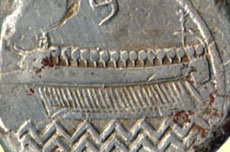 Contents -
Previous Article -
Next Article
Contents -
Previous Article -
Next Article
Tin was just such a product in the ancient world. Our technology today would not be possible without oil and electricity. In the same way, tin was vital to the ancients because it was needed in the making of bronze. Bronze was an alloy, or a mixture of two or more metals. To make bronze, the metalsmith mixed copper with the proper amount of tin. Copper tools and weapons by themselves were too soft and did not long remain sharp. Tin made the copper harder and also made the molten metal fill the mold more completely when it was cast into useful objects like axe heads, hammers, and jewelry. So many useful articles were made of bronze in ancient times that no civilization could thrive very long without a supply of it or the copper and tin needed to make it. The secrets of making iron were well known by the time the Romans made their entrance into history, but iron products were difficult to make, and rusted easily. Besides, it was hard to make iron that didn't have cracks and weak spots. With hard work and a skilled craftsman, good iron tools and weapons could be had but bronze was much more suitable for most metal articles.
The deposits of tin in the ancient world were usually small and not very plentiful. The Phoenicians discovered the tin deposits of the British Isles either from an early explorer or through their own exploring and seeking out of new products and markets for them. They kept the knowledge of the Cornish tin mines a closely guarded secret so they could control trade in the metal and charge a high price for it. After the Punic wars, Carthage, the one remaining city of the Phoenicians, became less and less an important economic power. With their well - known efficiency and thoroughness, the Romans counted access to the British tin mines as one of the advantages of conquering the island. Julius Caesar knew of the importance of British tin when he invaded the island in 55 to 54 B.C. After the conquest of Britain during the reign of Claudius, the Romans were in control of most of the world's supply of the metal. The province of Britain was not a highly profitable one to the Romans, but tin was one commodity that made it essential for the Romans to conquer and keep this remote part of their vast empire.
Go to next article:
Go back to previous article: